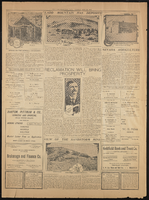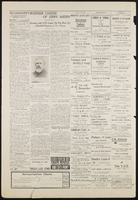Search the Special Collections and Archives Portal
Search Results

Dr. Nancy Leveque interview, July 3, 1975: transcript
Date
Archival Collection
Description
On July 3, 1975, Robin Wright interviewed Doctor Nancy Leveque (b. 1933 in Oak Park, Illinois) about her time living in Las Vegas, Nevada. The interview covers, among many wide-ranging topics, Leveque’s move to and away from Las Vegas, her career as a veterinarian, and the practice she and her then-husband built. Leveque also discusses how the city of Las Vegas has changed-environmentally and socially-, special interest groups and social activities, as well as natural phenomena. Throughout the course of the interview, Leveque provides anecdotes about prominent figures and old Las Vegas traditions, such as Helldorado.
Text
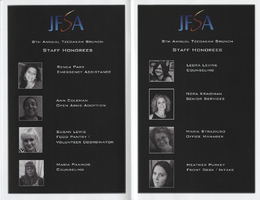
Pamphlet from the 8th annual Jewish Family Service Agency Tsedakah event, 2015
Date
Archival Collection
Description
This pamphlet contains statistics about Jewish Family Service Agency services provided to the community, and sponsorship advertisements from local businesses.
Text
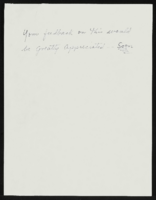
Roosevelt Fitzgerald: correspondence regarding UNLV Faculty merit awards
Date
Archival Collection
Description
From the Roosevelt Fitzgerald Professional Papers (MS-01082) -- Personal and professional papers file.
Text
Ronzone Family Papers
Identifier
Abstract
Ronzone Family Papers (1900-1991) include newspaper clippings, business documents, correspondence, certificates, yearbooks, publications, artifacts, and photographs. The papers document their lives in Nevada, their department store, and Dick Ronzone's involvement in local politics.
Archival Collection
Walking Box Ranch Photograph Collection
Identifier
Abstract
The Walking Box Ranch Collection (1880-1979, bulk 1930-1945) contains digital images compiled by the University of Nevada, Las Vegas (UNLV) Public Lands Institute. The collection consists of images of the Walking Box Ranch (Searchlight, Nevada), the Mojave Desert, and the Bell Family, consisting of American film stars Rex Bell, Clara Bow, and their children. There are also candid and professional photographs of Rex Bell and Clara Bow taken at various locations, some of which include friends and other family members, as well as a large number of unidentified film stills from Rex Bell movies. Images in this collection are from Bell family photograph albums and assorted prints, and were reformatted into digital images by the UNLV Public Lands Institute.
Archival Collection
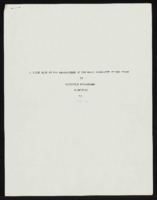
"A Brief Look of the Development of the Black Community of Las Vegas": manuscript draft by Roosevelt Fitzgerald
Date
Archival Collection
Description
From the Roosevelt Fitzgerald Professional Papers (MS-01082) -- Unpublished manuscripts file.
Text

Reika Sun oral history interview: transcript
Date
Archival Collection
Description
Oral history interview with Reika Sun conducted by Kristel Peralta on June 21, 2021 for Reflections: The Las Vegas Asian American and Pacific Islander Oral History Project. Reika Sun discusses her childhood in Shanghai, China during the "one-child policy" and her upbringing by nannies while her parents worked. She shares how her family immmigrated to Las Vegas in 2009 to reunite with Reika's aunt and how Reika moved to Kansas to attend an English as a Second Language (ESL) program at Kansas State University. Reika also talks about her restaurant employment history after returning to Las Vegas, her membership in the Culinary Workers Union, and Chinese traditions and superstitions she grew up learning.
Text
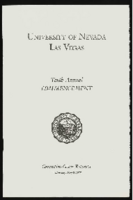
University of Nevada, Las Vegas (UNLV) 10th commencement program
Date
Archival Collection
Description
Commencement program from University of Nevada, Las Vegas Commencement Programs and Graduation Lists (UA-00115).
Text

